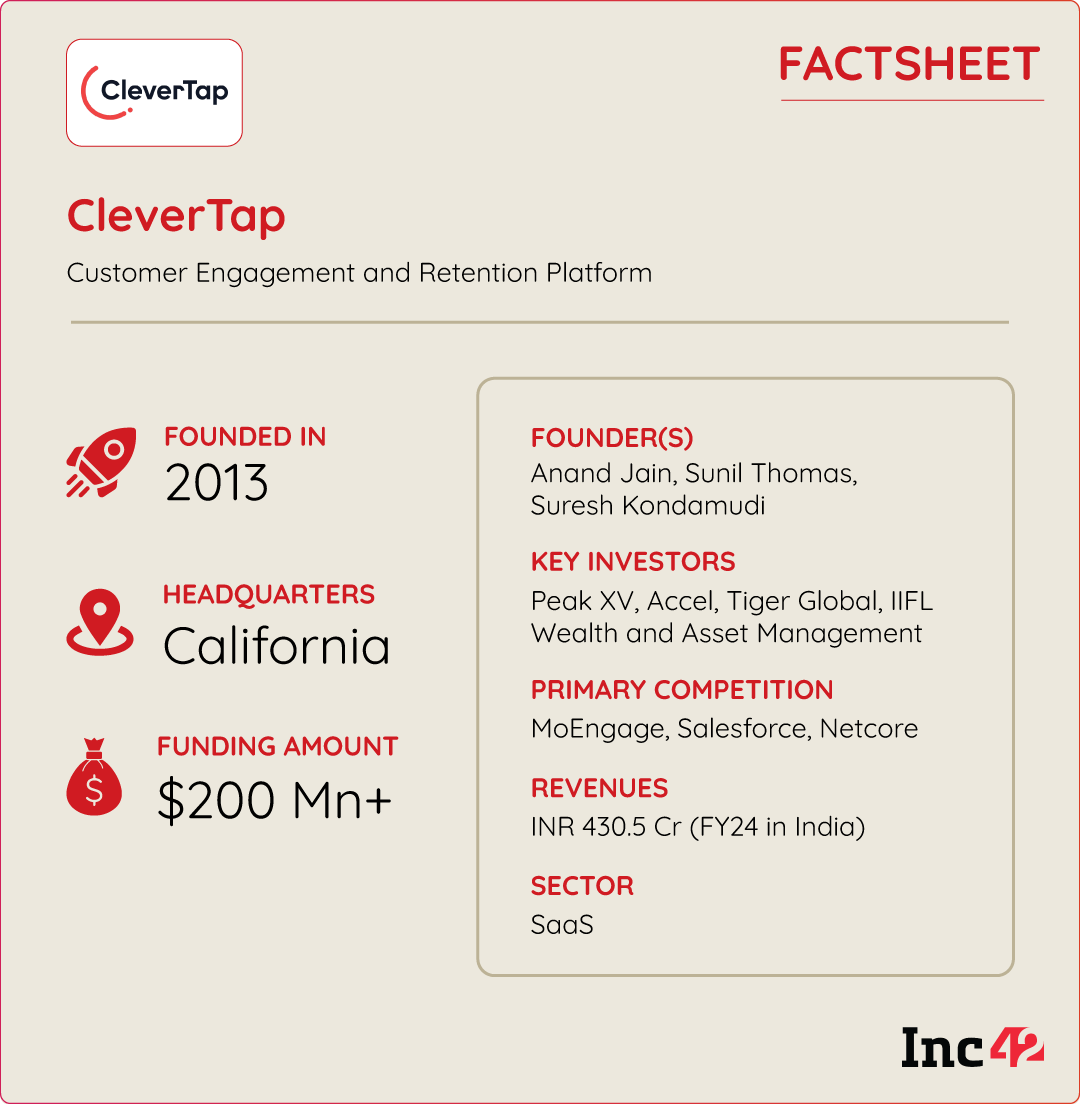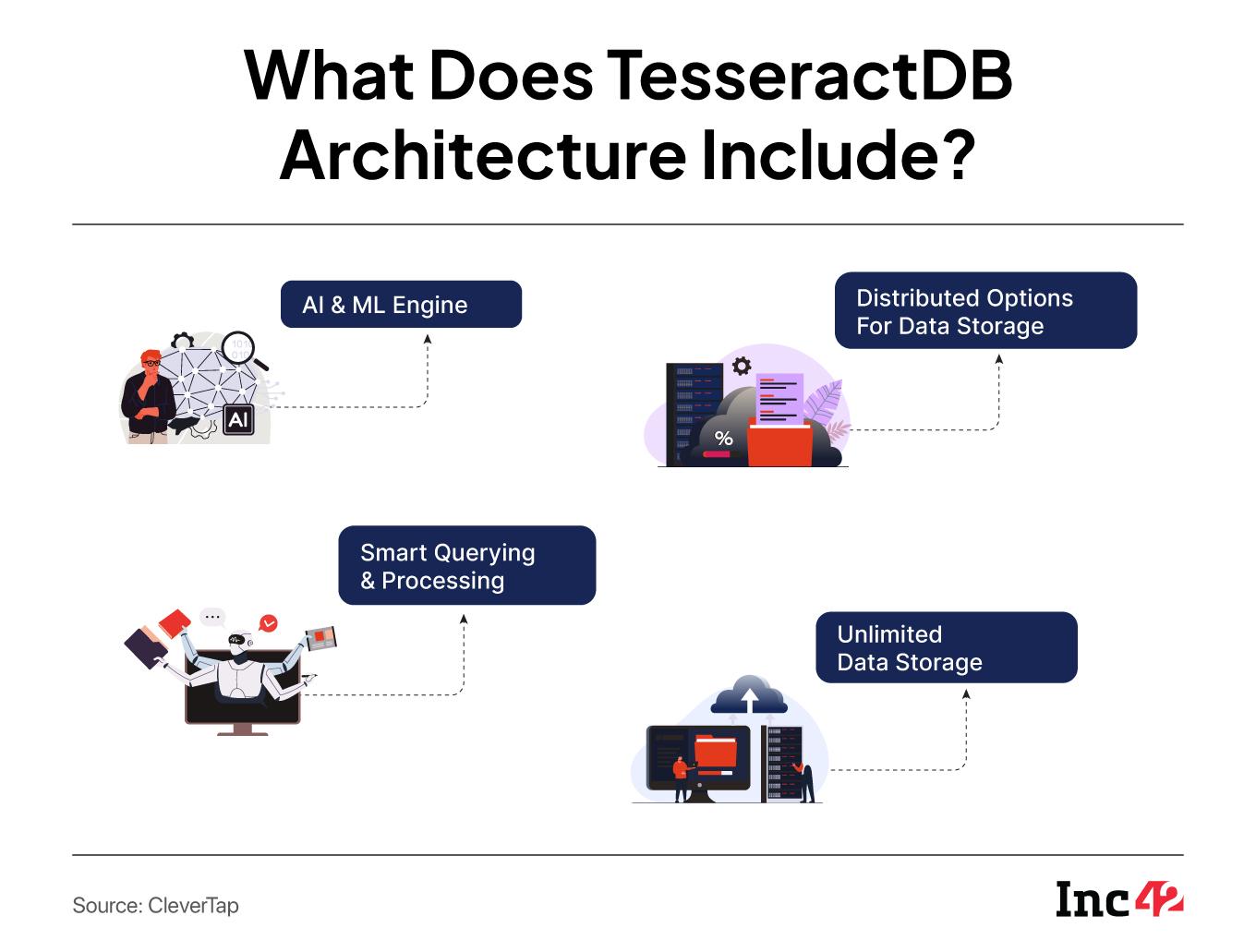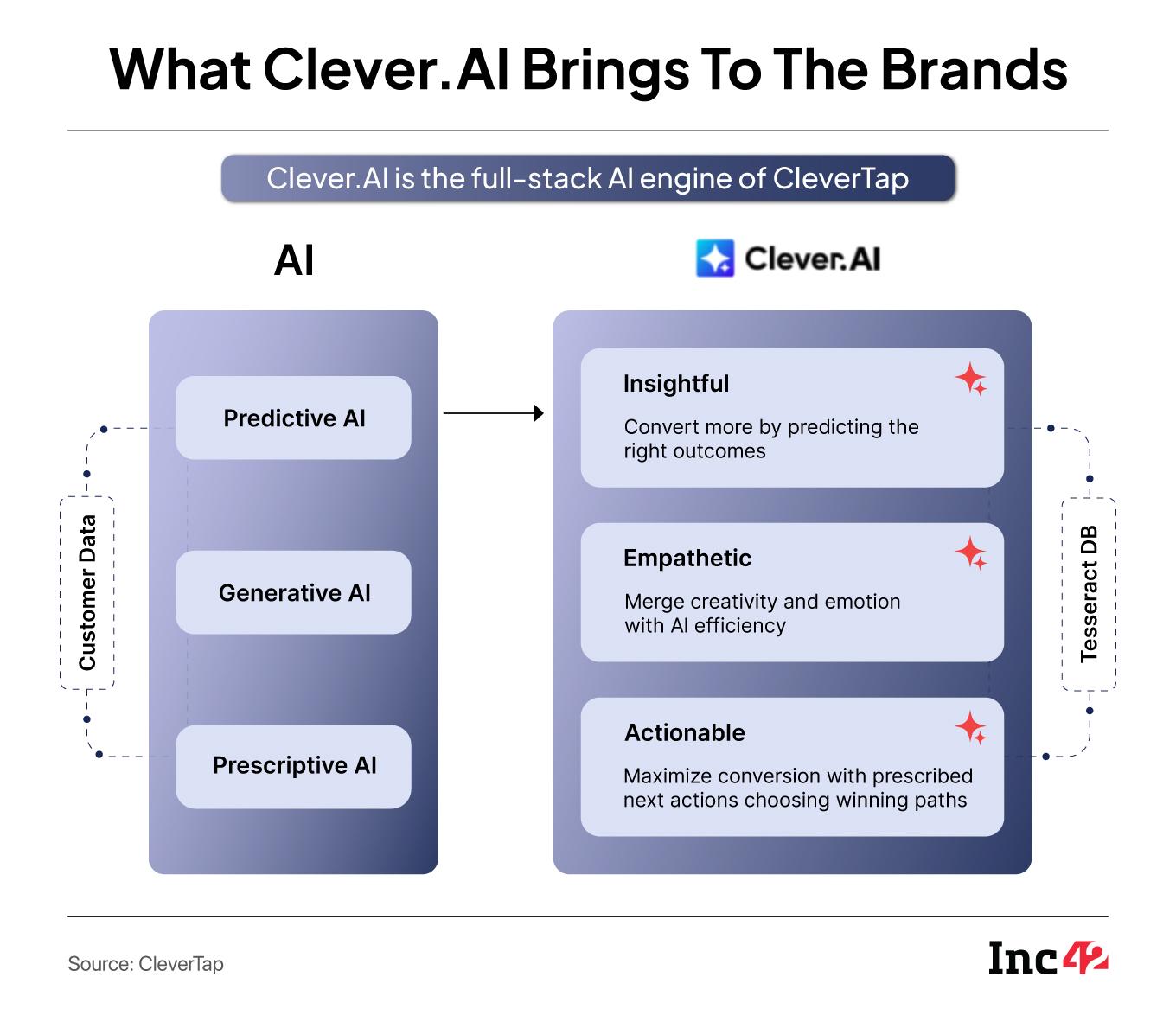When you idly tapped on the food delivery app the other day, did you have cold coffee on your mind? Or, on that one rainy evening, did you already crave a cup of steamy hot tea when the app flashed it on your screen? Or that streaming app, which recommends something altogether different for your friends than you?
Who’s reading your mind, you might wonder?
It’s the ever-curious AI that plays the trick with an algorithm to personalise your options on a real-time basis. And, brands seal the deal, as the option tempts you to hit ‘buy’. CleverTap deftly explored this opportunity using artificial intelligence more than a decade back to sync consumer preferences with messaging and offers from brands.
“There was data all over the place,” Anand Jain, cofounder and chief product officer of CleverTap, recalled the early days in 2013.
“It was all disconnected. The analytics players had the analytics data, the SMS provider had the SMS data, and two separate vendors would work on app analytics and product AB testing.”
This was the trigger point for CleverTap.
While the crux of marketing – persuading customers to purchase products or services to address their needs or wants – has remained constant down the ages, the adoption of advanced technology made it significantly sharper by creating value for both the customer as well as the brand.
Marketing technology or martech companies evolved from this juncture as enablers of better customer management strategy for brands. From the use of big data to machine learning-based algorithms, martech companies have found better tools and means to engage with customers more effectively, increase conversion rates, and retain them.
Over time, martech too became more sophisticated with the AI achieving new capabilities that helped improve customer interactions through predictive analytics, hyper-personalisation, and automated real-time actions and conversations. With digital advertising likely to surpass INR 59,200 Cr by end-2025, martech is expected to be a for tech startups around the same time.
CleverTap’s 12-Year JourneyFounded in 2013 by three former engineers at Network18 — Anand Jain, Sunil Thomas, and Suresh Kondamudi — CleverTap tried to plug the gaps in how customer data was collected and used by the enterprises.
The SaaS startup has been working on behavioural analytics with the use of a proprietary data analytics platform and AI algorithms to increase user engagement for brands.
CleverTap’s rise today to a $800 Mn startup shows the power of data and what it can unlock for brands. It claims to be working with over 2,000 brands across 100 countries, harnessing GenAI and agentic AI capabilities today, including Reliance Jio, Swiggy, SonyLIV, Decathlon and Croma.

The core platform is built around real-time predictive analytics, recommendations, messaging and boosting conversions for brands. And this building block has now been given a GenAI revamp in recent months.
The company claims to have recently helped Axis Bank boost its credit card upgrade conversions by 27% and says it devised a formula for AJIO to quadruple conversions with dynamic personalisation. Besides this, it claims that Rentomojo leveraged CleverTap’s solution to grow its user base by 36%.
Inc42 could not independently verify these claims, but behind the numbers, the story is that AI is changing the game.
The of a Y Combinator-backed promotion automation solutions startup, Rehook.ai underscores this belief, and CleverTap is using this acquisition to set up a blueprint for further leveraging AI to increase user engagement with brands.
But CleverTap’s experience with AI began well before the GenAI boom.
From Scattered Data To Proprietary TechJain recalled that in the beginning, the founders thought that they could put all the customer data “in one place and use it to activate multiple use cases such as predictions, segmentations, messaging, orchestrations, and so on”.
All of this is incredibly well understood today, but perhaps was not a core facet of app and brand engagement in a digital space back then. Journey orchestration, for instance, allows brands to granularly tailor their communications across multiple channels on the go. In an omnichannel retail world, this is a critical ammunition for brands in retaining fickle customers.
But this realisation came to the CleverTap trio when they were still at Network18. The media conglomerate did not want to dedicate resources to develop this platform internally. “The three of us then quit the company to found CleverTap and started working on our first product, TesseractDB,” the cofounder said.
It took the startup three years to fully build its core platform for customer engagement and retention, but the work began on day one. Instead, CleverTap relied on contextual data from user devices and other indicators to personalise the experience. At a granular level, contextual data on a real-time basis is the key to analyse the amount of nudge or offers a customer might require to buy a product.

“It’s hard if you don’t have your own database as a martech company. If you need to rely on a third-party database, you have to give a copy of all of it to a science team, and then they will do multiple cleanups of the data to create features out of this data. We never had that struggle,” Jain said.
He said that customers could go to the dashboard directly and run predictions such as how many people were likely to uninstall an app or tell the propensity of customers buying a product in the next 15 or 30 days.
Bringing Emotions Into AIUsing this base, CleverTap created a full-stack AI engine , which was launched in 2024. It was already showing insights such as predictions, prescribed course of action, catalogue management, and recommendations years before it started in 2022.
In particular, it built the module called IntelliNODE which helps brands calibrate the kind of promotion based on customer segmentation, and then target them with personalised messaging across various or specific communication channels.
IntelliNODE enables features on platforms that have become all too ubiquitous. Like popups asking if you really want to abandon the cart, or nudges based on discounts.
CleverTap says that IntelliNODE is built around an emotional framework, in which the AI recognises aspects such as trust, joy, surprise, anticipation, and fear (such as fear of missing out) to determine what kind of messages to send users.
These messages are typically push notifications or popup boxes on apps or websites which are seen as confirmation boxes in many cases.
In 2022, with the advent of GenAI, the company began using OpenAI’s API and integrated it with its proprietary AI capabilities to expand the product offerings. Its Clever.AI platform is built on the foundation of three core AI pillars: predictive, generative, and prescriptive.
Adding The GenAI EdgeCleverTap’s first major experiment with GenAI capabilities in 2020 resulted in Scribe, which generates messages in real time for the brands around the five emotional pillars. The product could tweak messaging based on emotions on the go, thanks to CleverTap’s proprietary AI technology.
Jain said CleverTap sends a few trillion notifications and about 15 Bn emails every month to its customer base, which is basically the end users of the brands and companies it works with. Except for delivering the email or messages, Clever.AI handles everything from deciding the right time and channel to the specifics of the content.
The cofounder did not disclose exactly how much all this costs, saying that it’s difficult to quantify this cost, since it’s so integral to the core platform that CleverTap has already built separately.

“Ours is an organisation led by engineers. It is but natural that we equip ourselves with tech evolution. We don’t need someone else to come and tell us that AI is very important, and make it part of your product strategy. It is this advantage that kept us at the forefront of this change,” Jain said.
With the entry of agentic AI, platforms like Clever.AI would further automate all these abilities. From segment selection to distribution to budget setting, and then framing the right message – agentic AI can do it all without any human intervention.
“Until now, all of us in the martech space were doing it based on the user behaviour, but with agentic, we can now marry a bunch of other things together to figure out what would be the right message for a particular user. CleverTap has all the lego blocks, now it’s time to slowly take our customers up the trust ladder,” Jain said.
So What’s Left To Solve?Any brand that’s operating in the ever-evolving digital landscape knows that messaging and communication is highly driven by individual and cultural norms. That’s the internal aspect, Jain believes, and is decided by the brand itself. CleverTap cannot set that benchmark.
On the external front, CleverTap assesses factors such as weather, location, and search habits to further personalise this. “Personalisation is still the biggest challenge for brands,” Jain emphasised.
In a bid to jump this hurdle, CleverTap is also working to sharpen its Indian regional language communication edge to help brands reach out to a wider audience. Following the recent , CleverTap is also set to launch Promos, which it claims to be an industry-first, full-service customer loyalty and promotion management platform.
The company is eyeing a 20%-25% growth rate in the next 12-18 months solely from products based on its AI-specific capabilities. In FY24, CleverTap recorded a slight increase in its revenue from the Indian markets which grew to INR 430.5 Cr. Jain did not comment on the FY25 numbers, where a lot of AI adoption has indeed happened.
But there’s little denying that CleverTap functions in a highly competitive segment, which is getting further heightened with the emergence of AI-first companies. Along with legacy enterprises such as Netcore, Hubspot and Salesforce, CleverTap also competes with the likes of WebEngage, MoEngage, and .
Many of these companies have deployed GenAI and agentic AI solutions to cater to the transition among the customer base. Efficiency is a key factor and many companies are deploying AI in-house to save costs. Jain says, thus far CleverTap has not resorted to layoffs due to automation coming into the picture
CleverTap also uses GenAI in certain internal use cases, such as customer success and building marketing campaigns. In fact, its Clever.AI platform has a module called Ask, which can assist businesses with real-time product-related information and support, which is also being used by the company internally to solve its own customer problems.
But Jain said that the company is yet to fully leverage the AI capabilities for internal use cases.
Also on the cards is a reverse flip to India from the US ahead of a potential IPO. Jain did not share any timeline for the public listing, but stressed that AI will be its biggest driver for growth in the coming years.
Competition is indeed growing in the AI space — even Zomato owner Eternal is an AI company now in some ways. Jain claimed that CleverTap enjoys an edge over many emerging and smaller startups because of its huge pool of end-user data.
“AI runs on customer data and smaller companies do not have it. If you are building a wrapper around OpenAI, even non-engineers can do that. But I think companies like us that started a decade ago, have a lot of customer data to build solid tech around it that will be more useful to the brands,” he said.
And Jain added that along the way CleverTap could even acquire more startups at the intersection of martech and AI. As he maintains, in the world of AI, it’s not scale but often the data that holds the edge.
The post appeared first on .
You may also like

After India, Pakistan expels Indian official, alleging activities 'incompatible' with privileged status

'Let's trade goods, not nukes': Trump told India, Pakistan

Former Defence Secretary Ajay Kumar appointed as UPSC chairperson

Legal expert says Liam Payne's £24million is out of reach for girlfriend Kate Cassidy

'Jaw-dropping' £58.2bn set aside to cover medical negligence






